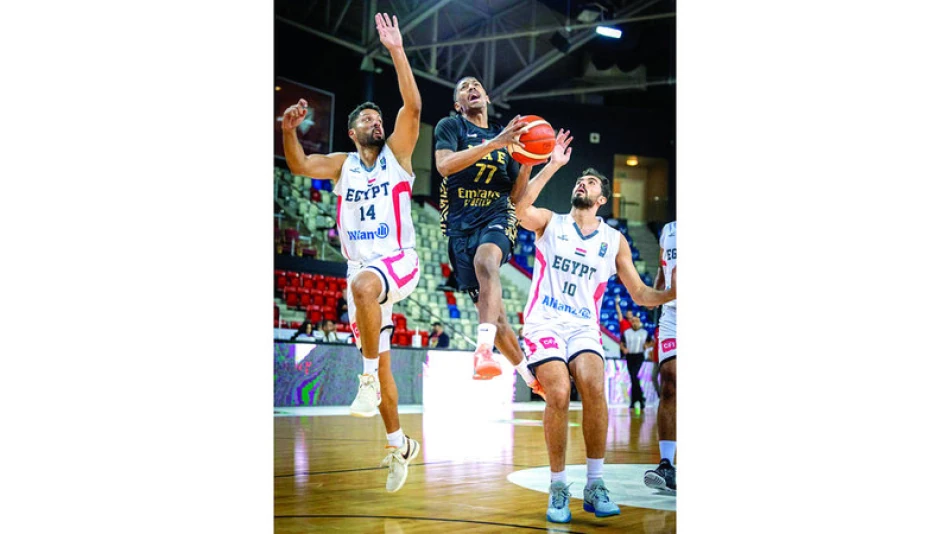
White Basketball Team Scores 4 Major Wins at the Arab Championship
UAE Basketball's Youth Revolution: Third Place Finish Signals New Era for National Team
The UAE national basketball team's bronze medal performance at the Arab Championship in Bahrain has revealed more than just tournament success—it has unveiled a generational shift that could reshape Emirati basketball. With seven key veterans absent, young players stepped up to deliver crucial performances, suggesting the national program has successfully cultivated depth that extends far beyond its traditional core.
Four Strategic Gains That Matter More Than the Medal
Rashid Al Naqbi, Director of National Basketball Teams, identified four critical achievements from the Bahrain tournament that extend beyond the third-place finish. The most significant was the emergence of what he calls a "renewed national team"—a squad where promising young talent successfully compensated for missing veteran leadership.
The tournament served as a high-pressure testing ground against established regional powers including hosts Bahrain, Algeria, Egypt, and Tunisia. For developing players, competing at this level provides invaluable experience that domestic leagues cannot replicate.
Young Players Earn Serious Minutes Against Elite Competition
The UAE's youth integration wasn't tokenistic. Young players logged between 20-30 minutes per game against teams that regularly compete in Asian and African championships. This level of trust in untested talent during meaningful competition suggests genuine confidence in their abilities rather than developmental experimentation.
Seif Al Rashidi, at just 20 years old, made his official national team debut with significant defensive and offensive contributions. The partnership between Abdul Aziz Khalifa (21) and Abdullah Hassan (23) formed a reliable foundation alongside experienced players, demonstrating tactical maturity beyond their years.
Technical Improvements Signal Tactical Evolution
Three-Point Shooting: From Weakness to Weapon
Historically, three-point shooting has been a persistent weakness for UAE basketball. The Bahrain tournament marked a dramatic reversal, with success rates approaching 40% in several games. This improvement stems from multiple sources: Khalifa Khalil's return to form, the emerging young duo of Abdul Aziz Khalifa and Abdullah Hassan, plus playmaker De Marco's distribution.
In modern basketball, three-point efficiency often determines competitive viability. Teams that cannot threaten from beyond the arc face defensive schemes that clog interior scoring opportunities. The UAE's improvement in this area suggests they can compete with more sophisticated offensive systems.
Physical Resilience Against African Basketball Schools
The tournament exposed UAE players to different basketball philosophies, particularly the physical, contact-heavy style characteristic of African teams. Successfully competing against Tunisia and Algeria while defeating defending champion Egypt demonstrates improved physical conditioning and mental toughness.
This experience proves valuable for future Asian competitions, where teams like Iran, Jordan, and Lebanon employ similarly aggressive defensive approaches.
Veteran Leadership Remains Crucial
While youth development dominated headlines, veteran contributions anchored the team's success. Qais Omar's return from injury yielded 24 points per game, reestablishing him as one of the Gulf region's premier power forwards. Ahmed Abdul Latif's improved play at center enhanced defensive rebounding—a fundamental requirement for competitive basketball.
The combination of veteran stability and youth energy created tactical flexibility that UAE teams have historically lacked.
Regional Context and Future Implications
The UAE's approach mirrors successful sports development models in neighboring countries. The UAE's investment in youth basketball infrastructure, including professional coaching and international exposure, appears to be yielding returns similar to their achievements in football and other sports.
For Gulf basketball, the UAE's youth movement could intensify regional competition. Traditional powers like Qatar and Kuwait may need to accelerate their own development programs to maintain competitive balance.
Tournament Results Reflect Broader Progress
The UAE's 3-3 record included victories over Kuwait (87-79), Bahrain (81-79), and Egypt (86-82), balanced against losses to Algeria (61-99), Tunisia (70-78), and Qatar (71-78). The narrow defeats suggest competitive parity with established programs, while the Egypt victory demonstrates capability against elite opposition.
More importantly, these results came without seven regular contributors, indicating genuine program depth rather than dependence on individual talent.
The Path Forward Requires Systematic Support
Al Naqbi emphasized that continued development requires comprehensive system support. Talented individuals need consistent coaching, competitive opportunities, and professional development to reach their potential. The UAE's basketball federation faces the challenge of maintaining momentum while preparing for upcoming Gulf and continental competitions.
Success in Bahrain provides a foundation, but sustainable improvement demands long-term commitment to player development infrastructure. The UAE's broader sports investment suggests resources exist—the question becomes whether basketball receives sufficient priority to capitalize on this emerging talent pool.
Most Viewed News

 Sara Khaled
Sara Khaled






